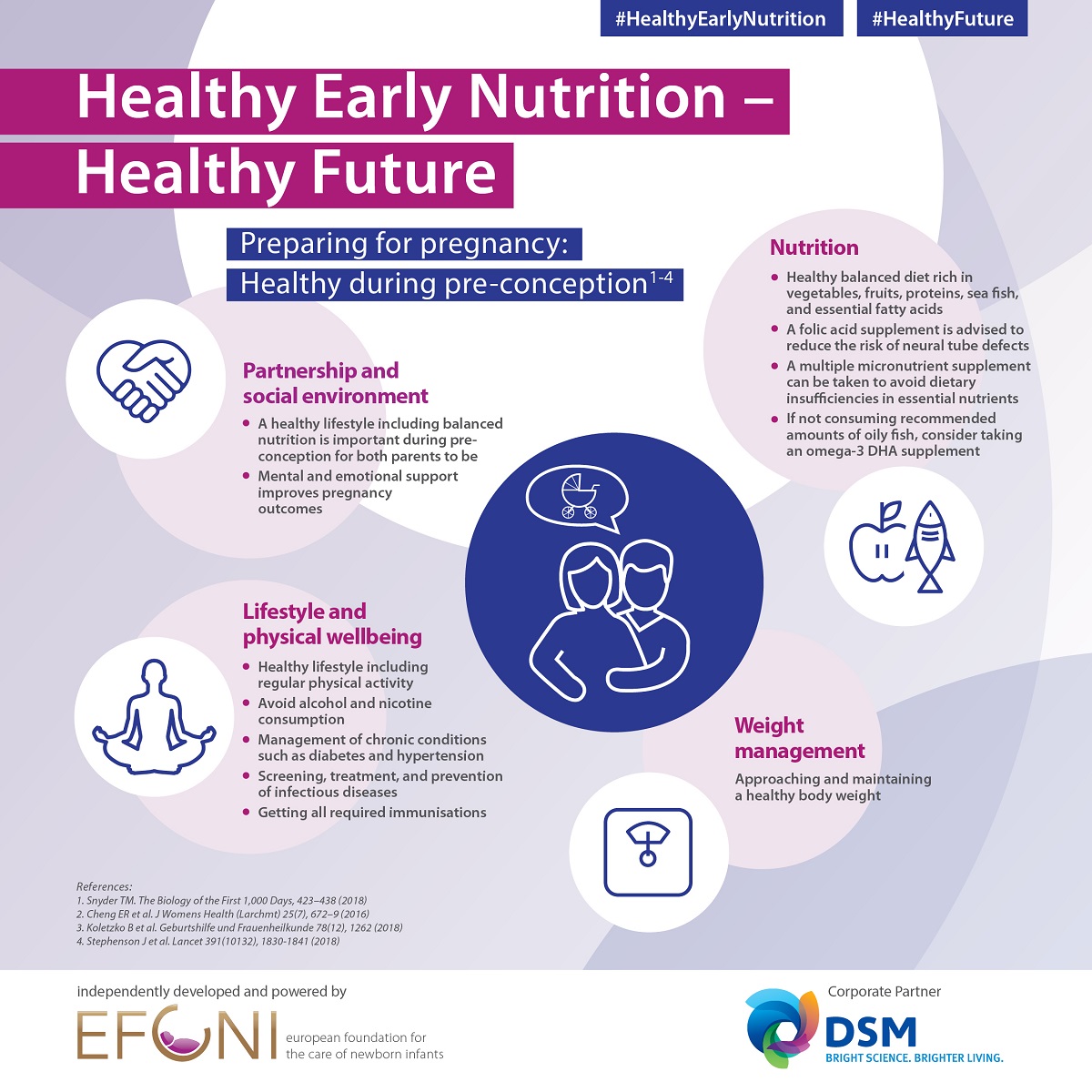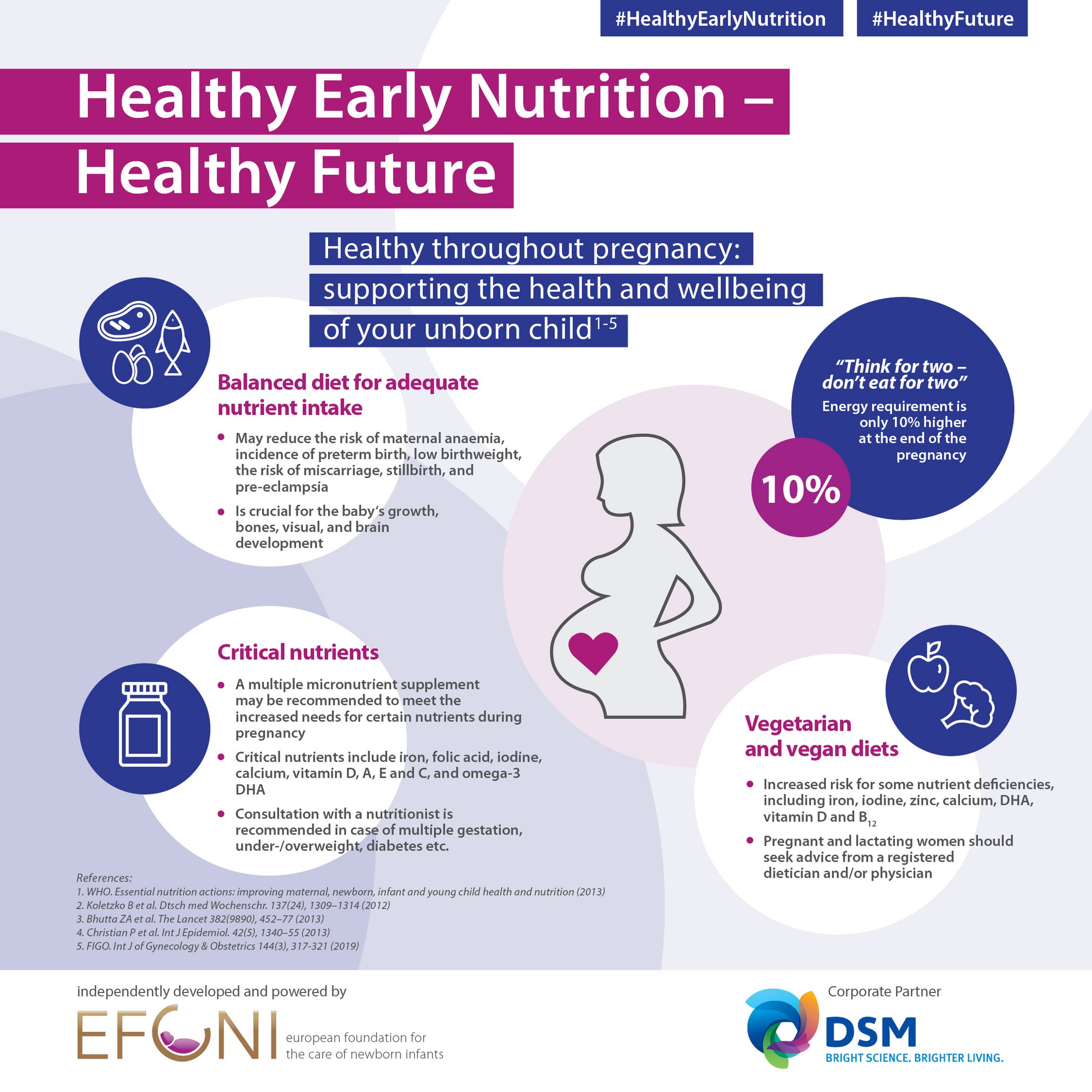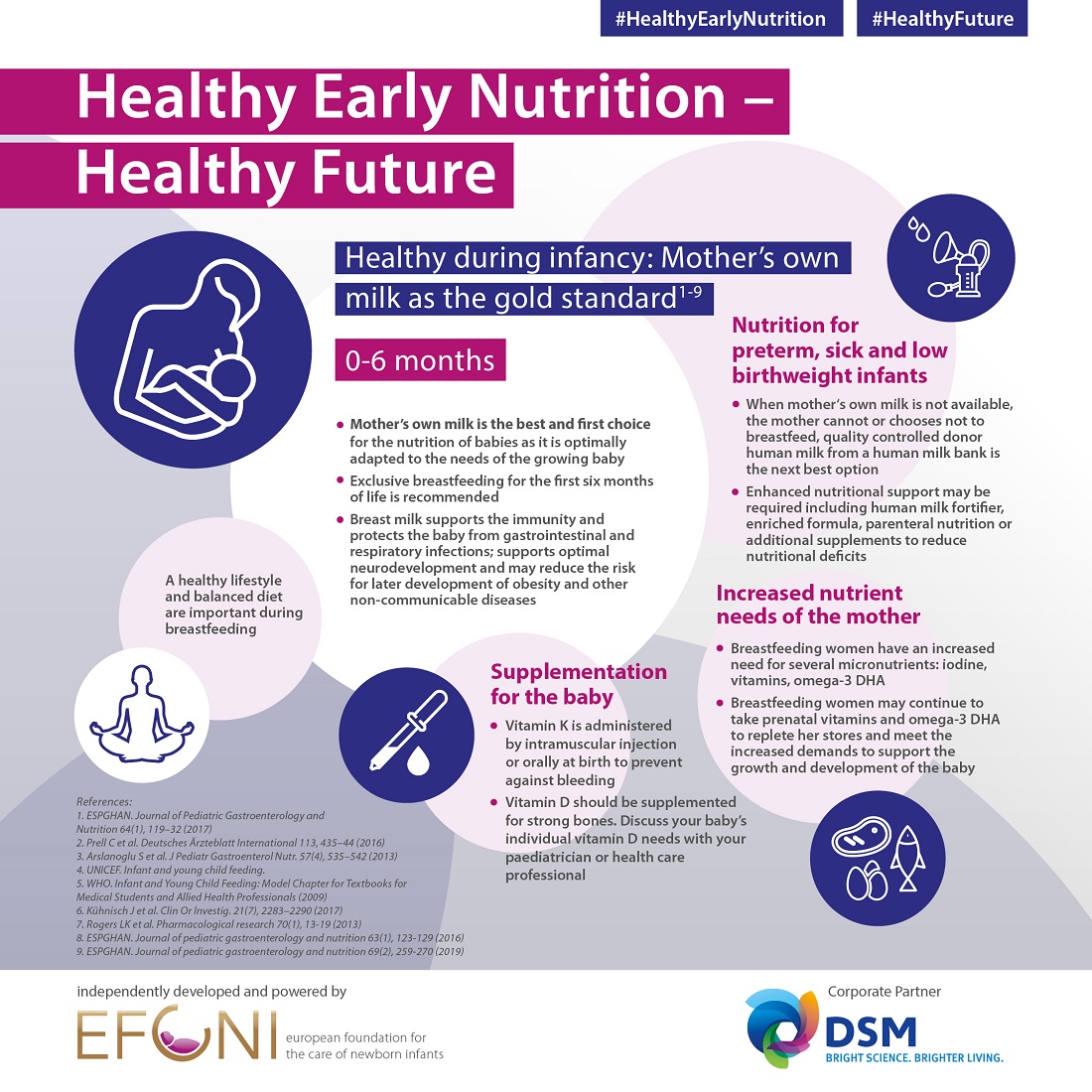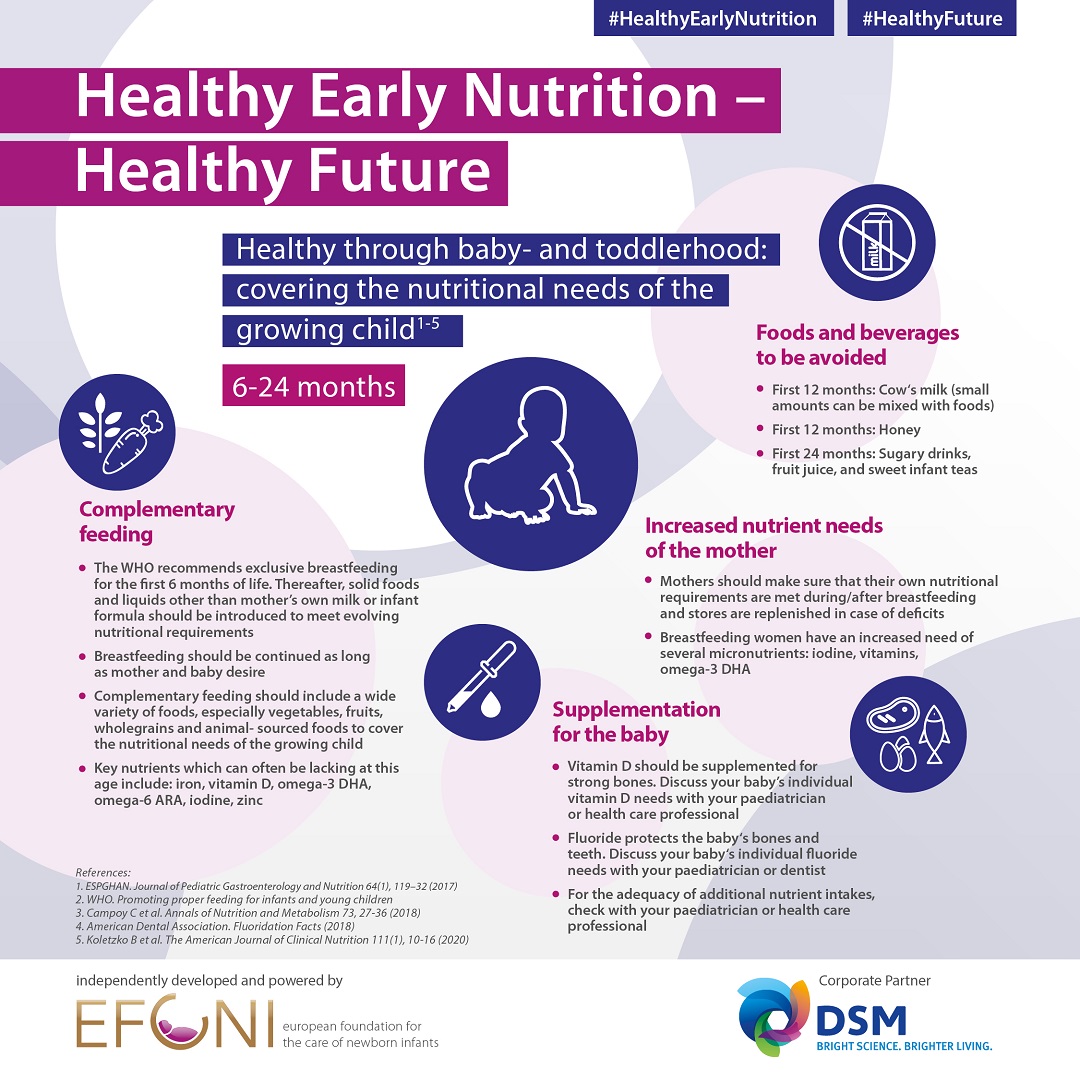Pregnancy Complications
Infant- and Family-Centered Developmental Care
Respiratory Infections
Neonatal Eye Health
Hygiene
Rare Diseases
The period between conception and a child’s second birthday is known as the first 1,000 days of life. This critical phase represents a unique window of opportunity to support the baby’s development, growth, and overall health. It also has both short-term and long-term health implications for the child, as well as for pregnant and lactating women.
A well-balanced diet that provides essential nutrients in optimal amounts during this time plays a key role in shaping future health. Empowering expectant parents and new parents to make informed choices about early nutrition is essential. Healthcare professionals can play a vital role in guiding families with accurate, evidence-based information.
Through our campaign, “Healthy Early Nutrition – Healthy Future,” we highlight the different phases of early nutrition—beginning with preconception, continuing through pregnancy, and extending into infancy and toddlerhood, up to the age of two years.
We also raise awareness about the increased nutritional needs during this period and the potential role of supplementation to complement a healthy diet and help ensure adequate intake of critical nutrients.
Because the first 1,000 days matter—and healthy early nutrition is the first step toward a healthy future.
For personalized guidance on nutrient intake during each stage, we recommend that pregnant women and individuals of childbearing age consult their healthcare provider or pediatrician.

A healthy lifestyle, including regular physical activity and balanced nutrition, is essential for parents-to-be. A diet rich in vegetables, fruits, lean protein, and sea fish helps meet the body’s increased nutritional demands in preparation for pregnancy—especially for women planning to conceive.
Folic acid, a source of folate, plays a critical role in the baby’s early development and helps reduce the risk of neural tube defects (NTDs), such as spina bifida and anencephaly. If you are planning to become pregnant or are already pregnant, your healthcare professional can guide you on the use of prenatal supplements, including folic acid, to support healthy growth and development.

During pregnancy, the baby is exposed to many of the same environmental influences as the mother, including nutrition. A well-balanced diet, moderate weight gain, regular physical activity, and a healthy work-life balance can support both maternal health and the baby’s development.
Regardless of the type of diet followed, it is important to ensure adequate intake of key nutrients such as:
For women who follow a vegetarian or vegan diet, special attention is required during pregnancy and breastfeeding. It is advisable to seek medical guidance before pregnancy to address potential nutrient deficiencies early. In general, a multiple micronutrient supplement may be recommended to meet elevated nutritional needs during pregnancy.
Alcohol, nicotine, and exposure to secondhand smoke should be avoided entirely.

Mother’s own milk is the ideal and first choice for infant nutrition. Breastfeeding should begin immediately after birth, and exclusive breastfeeding is recommended for the first six months of life.
Breastfeeding mothers should maintain a balanced diet and healthy lifestyle to meet increased nutritional needs, including:
For personalized nutrition guidance, consultation with a healthcare professional is recommended.
For the baby:

Complementary feeding, the introduction of solid foods and liquids other than breast milk or infant formula, should begin around 6 months of age, but no later than 7 months. Breastfeeding can and should continue for as long as mother and baby desire.
Because each baby develops at a unique pace, parents should watch for developmental readiness cues before starting solids. A variety of nutrient-dense foods should be introduced, including:
Avoid nutrient-poor foods that are high in sugar, fat, or salt, as well as honey and cow’s milk in the first year. Small amounts of cow’s milk may be used in food preparation from six months onward, but it should not be served as a drink before the age of one.
Explore our collection of easy-to-understand infographics highlighting essential information on healthy nutrition before and during pregnancy, while breastfeeding, and throughout early childhood. Each visual offers clear, evidence-based guidance to support informed decisions during the first 1,000 days of life.
We spoke with Professor Irene Cetin, expert in Obstetrics and Gynecology at the Department of Biomedical and Clinical Sciences, University of Milan, Secretary at Società Italiana di Ginecologia e Ostetricia (SIGO), and member of FIGO, about current recommendations for pregnant and lactating women regarding DHA (docosahexaenoic acid)—an essential omega-3 fatty acid.
In the interview, Professor Cetin explains:
Our conversation with Professor Liona Poon, Head of Maternal Medicine at the Chinese University of Hong Kong and Prince of Wales Hospital and Vice Chair of the FIGO Committee, focused on the long-term health impacts of pregnancy.
Professor Poon shares insights on:
Explore a curated selection of evidence-based resources to deepen your understanding of early nutrition during the first 1,000 days of life. From expert-developed checklists to scientific publications and practical factsheets, these materials provide insights for healthcare professionals, parents, and caregivers alike. Each resource is accompanied by a short description and visual to help you navigate the content more easily.
The FIGO Nutrition Checklist is a practical, validated screening tool developed by the International Federation of Gynecology and Obstetrics (FIGO). It helps healthcare providers assess and support women’s nutritional status before and during pregnancy, promoting better maternal and child health outcomes.
All content in the “Healthy Early Nutrition - Healthy Future” campaign was independently developed by GFCNI and reviewed by external experts for medical accuracy. The campaign is powered by GFCNI.

We extend our sincere thanks to the International Federation of Gynecology and Obstetrics (FIGO) for their valuable collaboration and support of this campaign.
dsm firmenich supported the campaign from 2021 until 2024 but had no influence on its content or messaging.
© 2026 GFCNI. All Rights Reserved.